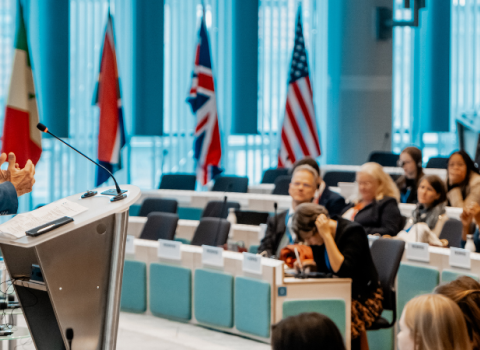In a first for the country, a central repository, Biodiversity Biobanks South Africa (BBSA), was launched to conserve and manage biodiversity samples on 1 March 2023. BBSA is the coming-together of a diverse group of biobank managers to form a network of institutions dedicated to improving the quality of (and access to) live samples from plants, animals, bacteria and fungi in one of the world's most megadiverse regions.
The BBSA was established under the Department of Science and Innovation's South African Research Infrastructure Roadmap.
The launch of the BBSA is the culmination of a process that started in 2018, which included community engagements, proposal development and approval, and the signing of an agreement between the South African National Biodiversity Institute (SANBI) and the Department of Science and Innovation (DSI) at the beginning of 2021.
The BBSA is funded by the DSI and coordinated and hosted by SANBI.
"Increasingly, good science is about collaboration and coordination," said Imraan Patel, DSI Deputy Director-General: Research and Development Support. "And coordination doesn't happen by money alone. While we are proud to have been able to fund this effort to build research infrastructure, the hard work was done by you, the community. Of course, the hard work isn't over yet – but I'm sure the impact of these partnerships will be felt at a local and even global level."
The need for a central biobank was identified to coordinate the range of biodiversity biobanks scattered throughout the country. These biobanks could be found at universities, research facilities and national parks, and were handling live cultures of bacteria and single-celled organisms, blood samples from sheep and goats (and rhinos and leopards), and seed and germplasm from domesticated and wild plants, among others.
The BBSA's project lead, Prof. Michelle Hamer, estimated that biobanks in South Africa were handling over a million samples, collected over up to 200 years.
"But, until recently, everybody was working in isolation. Each biobank had to find their own way of handling their challenges, their own ways of collecting and storing and analysing samples. Not only was this incredibly inefficient, but it also created lots of issues around trust and credibility – and accessibility," said Prof. Hamer.
The BBSA provides a coordinating structure across several of South Africa's existing biodiversity biobanks, with the main aim of increasing the range and quality of samples stored and/or distributed, and improving access for research and development through a single, centralised data portal, which will also allow a more strategic collection of samples.
Some of the many BBSA biobanks include the Department of Agriculture, Land Reform and Rural Development's National Plant Genetic Resources Centre, the Grootfontein Biobank for South African sheep and goat breeds, and several Agricultural Research Council biobanks. South African National Parks has veterinary wildlife service biobanks in Skukuza and Kimberley, the South African Institute for Aquatic Biodiversity has one, and SANBI's has a biobank with indigenous plant material for DNA extraction. There is a herpetology biobank, and one for indigenous plants and seeds, as well as the University of the Free State's yeast culture collection, and an extensive collection of microbial isolates at the University of Western Cape's Institute of Microbial Biotechnology and Metagenomics.
The importance of the BBSA extends beyond just the biobanking community, explained the SANBI CEO, Mr Shonisani Munzhedzi.
"At SANBI, we understand that the impact of the biodiversity sector is broad," he said. "Our understanding of biodiversity affects our understanding of the arts, culture, health, technology, sport and more. The way we manage our biodiversity affects our economy, our environment, and our society. And we can't manage what we don't know. So the work done by the BBSA is of the utmost importance."
Last week's launch formed part of a three-day Biodiversity Biobank SA Forum, that brought the country's biodiversity biobank community together to discuss the value and role of biobanks in food security, conservation, biotechnology innovation and capacity development.
For more information, contact Prof. Michelle Hamer at [email protected] or Taslima Viljoen at 082 990 1685.
About Biodiversity Biobanks South Africa
Biodiversity Biobanks South Africa (BBSA) provides a system of repositories of genetic resources, including reproductive tissues such as seeds, egg and sperm, and other tissues including blood, DNA extracts and microbial cultures, representing species, strains, varieties and breeds present in South Africa, including domesticated crops and livestock. Its collections can be used to support research, capacity development and the development of new or improved products and practices in the fields of agriculture, human health and well-being, environmental management and conservation biology.
About the South African National Biodiversity Institute
The South African National Biodiversity Institute (SANBI) contributes to South Africa's sustainable development by facilitating access to biodiversity data, generating information and knowledge, building capacity, providing policy advice, and showcasing and conserving biodiversity in its national botanical and zoological gardens. SANBI is tasked with research and the dissemination of information on biodiversity, and legally mandated to contribute to the management of the country's biodiversity resources, under the authority of the South African Department of Forestry, Fisheries and the Environment.
Issued by the South African National Biodiversity Institute (SANBI) and the Department of Science and Innovation
This article was first published on 6 March by South Africa Department of Science and Innovation.





 A unique international forum for public research organisations and companies to connect their external engagement with strategic interests around their R&D system.
A unique international forum for public research organisations and companies to connect their external engagement with strategic interests around their R&D system.